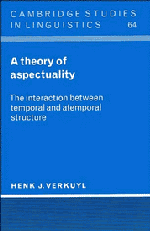2 - Aspectual classes and aspectual composition
Published online by Cambridge University Press: 05 July 2011
Summary
Introduction
Aspectual classes appear to play an important role in the linguistic and philosophical literature these days, judging from the many references to Vendler's ‘Verbs and Times’. In the literature on aspect, it is hard to find a contribution that does not refer to this philosophical essay.
What did Vendler actually propose? The question is of some importance because it is a rather striking feature of his analysis that he kept the quadri partition at the lexical level. He used the term ‘term’ to denote verbs, even though he seemed to be aware of the fact that his categories are complex in the sense that, for example, the direct object appears to co-determine whether or not a transitive verb belongs to one of the four categories. His inclination to stay at the lexical level enforces the idea that what he really did was to propose ontological categories: if knowledge of the world and knowledge of a language tie up intimately at some place, they do that at the lexical level and not so much at the structural level (Putnam 1978; Dowty 1979; Partee 1980).
Vendler's classification, however, turned out to relate to linguistic work on aspect. Some of his criteria were well known in the literature on the imperfective and perfective aspect in Slavic languages. As said earlier, the implication that each of his lexical classes can be used in the theory of aspectuality actually constitutes a setback.
- Type
- Chapter
- Information
- A Theory of AspectualityThe Interaction between Temporal and Atemporal Structure, pp. 33 - 67Publisher: Cambridge University PressPrint publication year: 1993



